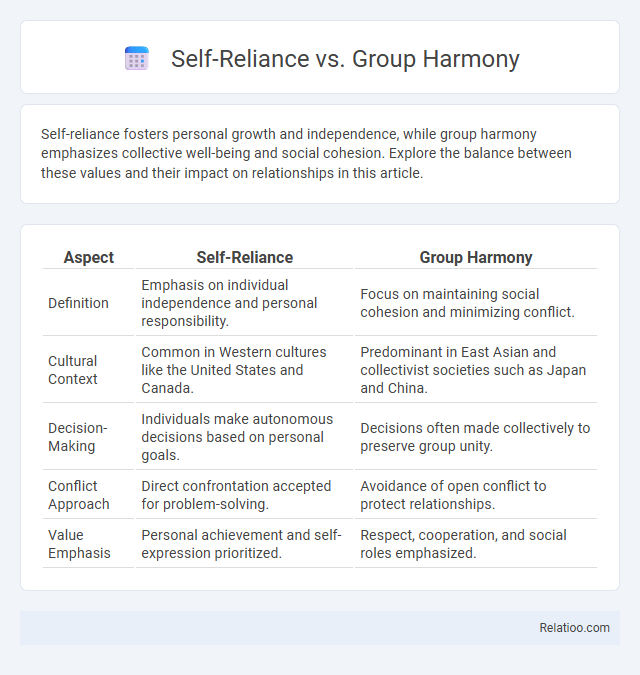Self-reliance fosters personal growth and independence, while group harmony emphasizes collective well-being and social cohesion. Explore the balance between these values and their impact on relationships in this article.
Table of Comparison
| Aspect | Self-Reliance | Group Harmony |
|---|---|---|
| Definition | Emphasis on individual independence and personal responsibility. | Focus on maintaining social cohesion and minimizing conflict. |
| Cultural Context | Common in Western cultures like the United States and Canada. | Predominant in East Asian and collectivist societies such as Japan and China. |
| Decision-Making | Individuals make autonomous decisions based on personal goals. | Decisions often made collectively to preserve group unity. |
| Conflict Approach | Direct confrontation accepted for problem-solving. | Avoidance of open conflict to protect relationships. |
| Value Emphasis | Personal achievement and self-expression prioritized. | Respect, cooperation, and social roles emphasized. |
Understanding Self-Reliance: Definition and Core Values
Self-reliance is the capacity to depend on your own abilities, judgment, and resources to solve problems and make decisions without excessive guidance from others. Core values include independence, confidence, resilience, and personal accountability, which foster autonomy in both personal and professional settings. Emphasizing self-reliance encourages you to cultivate inner strength and initiative, distinguishing it from the collective focus of group harmony or the freedom-centered ethos of individualism.
The Essence of Group Harmony in Society
Group harmony centers on fostering cooperation, mutual respect, and social cohesion, ensuring that individual actions contribute positively to the collective well-being. Your role within this dynamic involves balancing personal desires with shared responsibilities to maintain stability and trust among community members. Emphasizing empathetic communication and collective goals, group harmony minimizes conflicts and supports societal resilience.
Cultural Perspectives on Independence and Collectivism
Cultural perspectives shape the balance between self-reliance, group harmony, and individualism, influencing how societies prioritize independence or collectivism. In individualistic cultures, self-reliance fosters personal achievement and autonomy, while collectivist cultures emphasize group harmony and interdependence to maintain social cohesion. Understanding these cultural dynamics helps you navigate social expectations and communication styles effectively in diverse environments.
Psychological Benefits of Self-Reliance
Self-reliance fosters psychological resilience by enhancing an individual's sense of personal competence and autonomy, which contributes to higher self-esteem and reduced anxiety. Individuals who cultivate self-reliance develop stronger problem-solving skills and emotional regulation, promoting mental well-being and adaptive coping mechanisms. This intrinsic motivation supports sustainable personal growth and psychological stability, distinguishing it from external validation sought in group harmony or individualistic cultures.
Social Advantages of Group Harmony
Group harmony fosters social cohesion by promoting cooperation, mutual support, and collective well-being, enhancing community resilience and reducing conflicts. It encourages shared values and trust, which facilitate effective communication and coordinated efforts toward common goals. Your participation in a harmonious group helps create a supportive environment that strengthens social bonds and improves overall societal stability.
Self-Reliance in Personal Development
Self-reliance in personal development emphasizes cultivating independence, critical thinking, and problem-solving skills to navigate challenges without overdependence on others. It fosters resilience by encouraging individuals to trust their abilities and make decisions aligned with their values, enhancing confidence and self-efficacy. This approach contrasts with group harmony and individualism by prioritizing personal accountability and internal growth as foundations for success.
Group Harmony’s Role in Conflict Resolution
Group harmony plays a crucial role in conflict resolution by emphasizing collective well-being and fostering mutual respect among members. This approach prioritizes maintaining social balance and minimizing disruption, which helps in creating an environment conducive to collaboration and understanding. Your ability to navigate conflicts effectively can be strengthened by adopting strategies that align with group harmony principles, promoting peaceful interaction and long-term cohesion.
Balancing Individual Goals with Collective Well-Being
Balancing individual goals with collective well-being requires cultivating self-reliance while respecting group harmony and embracing individualism. Your ability to assert personal ambitions contributes to the community's strength when aligned with shared values and cooperative efforts. Effective balance enhances social cohesion and personal fulfillment, optimizing success both individually and collectively.
Challenges of Excessive Self-Reliance or Group Harmony
Excessive self-reliance can lead to isolation and hinder collaboration, causing difficulty in seeking support or sharing resources when needed. Overemphasis on group harmony may suppress individual creativity and prevent open communication, resulting in unresolved conflicts and decreased innovation. Balancing self-reliance with group harmony is crucial for your personal growth and effective teamwork.
Striking the Right Balance: Strategies for Modern Life
Striking the right balance between self-reliance, group harmony, and individualism involves cultivating personal responsibility while respecting the collective needs of your community. Emphasizing adaptive communication and empathetic collaboration enhances productivity and social cohesion without compromising your unique identity. Prioritizing flexibility and mindfulness in these strategies ensures sustainable success in diverse modern environments.

Infographic: Self-Reliance vs Group Harmony
 relatioo.com
relatioo.com